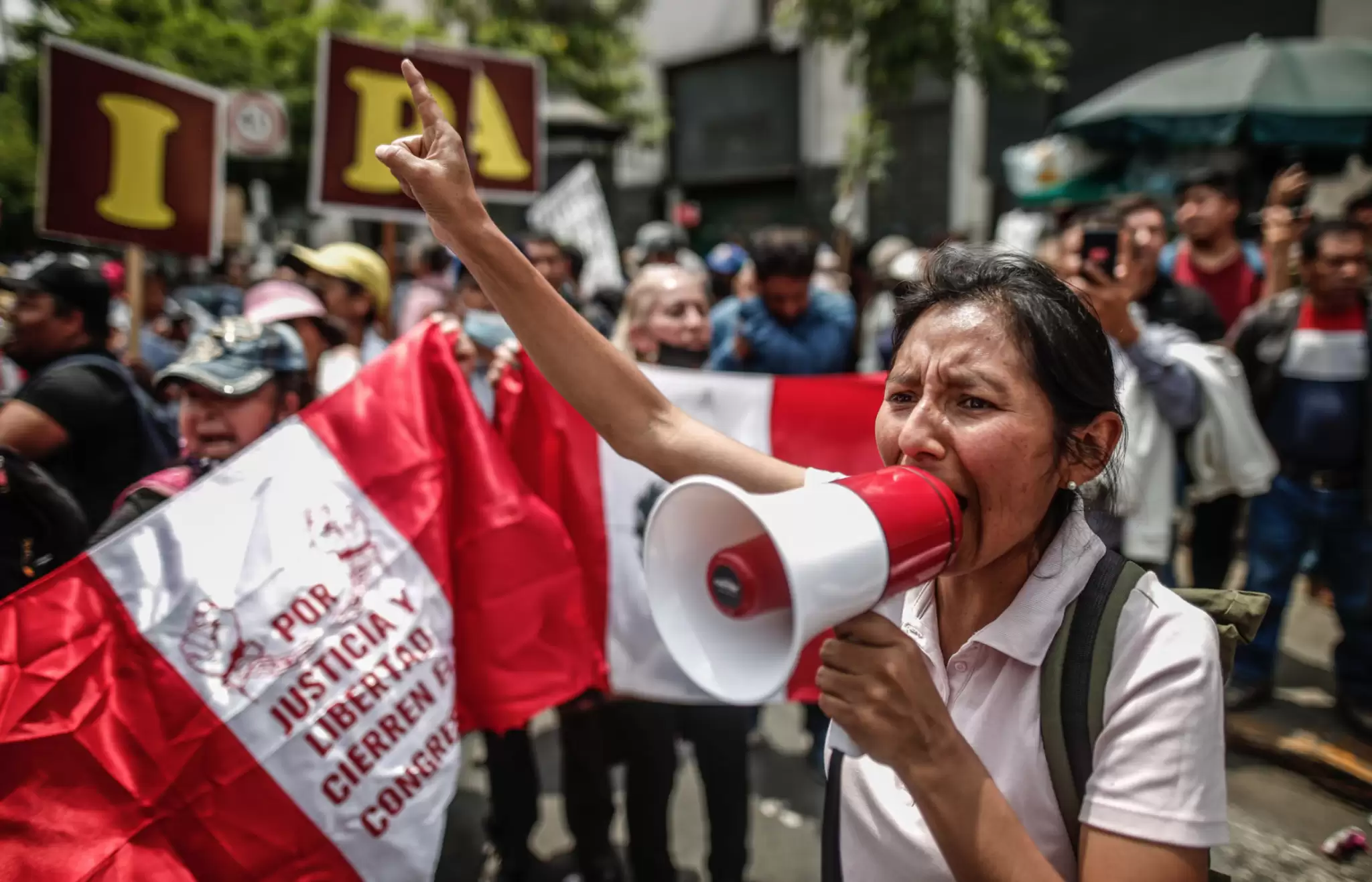When the Vice President of Peru, Dina Boluarte, assumed the Presidency to replace Pedro Castillo, it was expected that there would be months of tranquility. Congress even approved a law reducing her mandate by bringing forward elections to April 2024. However, within a few days, mobilizations flooded the streets almost all over the country to protest against the measures, which were considered insufficient.
So far, the protests have resulted in at least 46 citizens killed by the security forces, while exercising their right to demonstrate and to demand the closure of the Congress of the Republic, the convocation of a Constituent Assembly, and the resignation of Boluarte. To this day, the violence has done nothing to calm down the political atmosphere.
On the other hand, the far-right groups that dominate the Congress of the Republic and that have declared themselves “victorious” due to the departure of Pedro Castillo are trying to pave the way – at any cost – to guarantee their victory in the next electoral battle that has been called for April 2024.
The indignation, however, is amplified, due to the fact that groups of congressmen began to look for a way to legalize their reelection. Although it is true that this proposal is still valid in a normalized environment, at present, altering the rules of the electoral process for one’s own benefit is a provocation.
Furthermore, these groups have presented a bill that intends to diminish and substitute the mandate of the current electoral authorities. Although in the last electoral dispute, they acted in an impartial and transparent manner, these congressmen say that they favored Castillo’s election.
At the same time, these ultra-right groups intend to disqualify potential candidates for the next election, however, based on the modality of constitutional complaints, as is the case of former presidents Martin Vizcarra and Francisco Sagasti. Such denunciations were presented and, subsequently, may be approved by these groups.
If the Congress considered that it had control of the political agenda by April 2024, the social movements, basically regional (more organized in the south of the country), want to change a backward position due to the power vacuum left by Castillo and the political defeat of the Peru Libre Party, the main organization that supported the former president.
In order to contain these movements and as a consequence of the violence, the right-wing sectors aspire to impose an agenda that ignores the legitimate aspirations of those demonstrating in the streets (meanwhile, the movements are growing up and could bring down President Boluarte herself).
The intolerance and racism against the regions of those who dominate Congress have led them to accuse the demonstrators of being “terrorists”. In this way, they openly and shamelessly justify the physical elimination of the victims and selectively overestimate the radicalism of some of the demonstrators in order to confront them all with greater violence.
For her part, the president, who was part of the group of Pedro Castillo and Vladimir Cerron (head of Peru Libre), had the option of turning her position of weakness (without support in Congress) into one of strength. She could have imposed conditions on Congress when she took office, or she could have promoted a broad agenda on the debate of calling – or not – a Constituent Assembly that could be decided in April 2024. However, she opted for a different path.
The president preferred to ensure her permanence in power, but without capacity or influence, and assumed the discourse and actions of the far-right groups. Today Boluarte assumes responsibility for the tragic episodes in which in the first case 28 people died in different regions of the country, then another 17 in the city of Juliaca, and one in Cusco. In spite of the excessive violence, it has not contributed to appeasing the indignation of the citizens.
The anti-democratic and intransigent attitude of the right-wing sectors does not even contemplate the debate on the need to elaborate – or not – a new Constitution, much less allow Peruvians to decide on its continuity – or not – in a referendum. They resist substantial changes in the very institutional design that gives rise to instability and conflict and continue to impose criteria of legality over those of legitimacy, given that the latter does not reflect the results of a social pact. Let us remember that the 1993 Constitution, in addition to being imposed, was approved by means of a referendum marked by fraud.
Regardless of the evaluation of Castillo’s government and the questionable attempt to break the constitutional order, his preventive imprisonment could be lifted as a form of amnesty, since the attempt had no objective consequences, and his freedom would not imply risks to society, which would allow, in turn, his asylum in Mexico. This solution would contribute to attenuating the tensions due to the frustration of his voters who witnessed the permanent actions to make his government unviable.
The road back to normality is full of difficulties. In fact, for Prime Minister Alberto Otárola, who recently received the confidence of the Congress, it was more important to protect the capital from the contagion of the protests (to do so, he relegated the regional demands) than to promote unity and dialogue, which was what was expected. Based on his harmony with Congress, Otárola has become the prime minister with the highest approval among parliamentarians, despite being politically responsible for the massacres in the country.
The violation of human rights that the country has suffered during the last few days should invite all political actors to greater consideration. Discussing a new political and social pact is undoubtedly the way to strengthen Peruvian society and its democracy. Avoiding it will make Peru an invisible country.
*Translated from Spanish by Janaína Ruviaro da Silva












